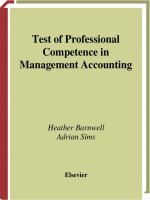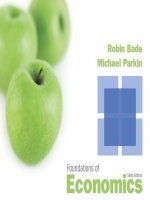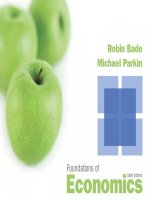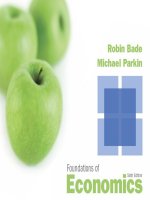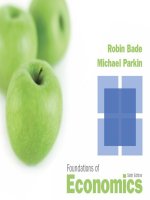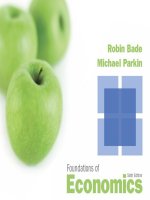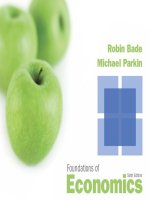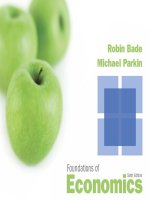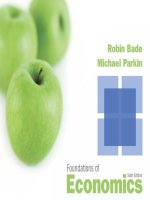Testbank of fundamental of management 7e by robin ch 06a
Bạn đang xem bản rút gọn của tài liệu. Xem và tải ngay bản đầy đủ của tài liệu tại đây (121.28 KB, 31 trang )
Fundamentals of Management, 7e (Robbins/DeCenzo/Coulter)
Career Module
1) A career is a best defined as a sequence of jobs.
Answer: TRUE
Explanation: Though the word career can mean a profession or advancement within a
profession, the best definition of career is that it is a lifelong sequence of work positions.
Diff: 2
Page Ref: 185
2) An individual typically has several careers over a lifetime.
Answer: FALSE
Explanation: A person may have several jobs over a lifetime, but not several careers. The series
of jobs themselves comprise the career, so a person cannot have more than one career no matter
how many different jobs he or she holds.
Diff: 2
Page Ref: 185
3) The term career applies only to high-level professionals such as designers or physicians, not
laborers.
Answer: FALSE
Explanation: All workers have a career, whether they are sophisticated and highly skilled or not.
Diff: 2
Page Ref: 185
4) In the past, career development was usually confined to advancement within a single
organization.
Answer: TRUE
Explanation: In previous generations, career development typically charted out the path that a
person would take to secure advancement within a single organization. Now most careers
involve switching organizations multiple times.
Diff: 2
Page Ref: 185
5) Traditional career development in which an individual advances through the ranks of a single
organization is more popular than ever.
Answer: FALSE
Explanation: Traditional single organization career development has all but disappeared into
today's work world.
Diff: 2
Page Ref: 185
6) Today, the organization—not the individual—is responsible for the employee's career
development.
Answer: FALSE
Explanation: The opposite is true—in today's world it is the individual that is responsible for
career development. The organization has largely abdicated its role as the guide and guardian of
a worker's career.
Diff: 2
Page Ref: 185
1
Copyright © 2011 Pearson Education, Inc
7) A boundaryless career is a career in which an individual takes responsibility for his or her own
career.
Answer: TRUE
Explanation: In the past, a career was usually confined within the boundaries of a single
organization. Today, when individuals move frequently from organization to organization, the
boundaries of a career have largely disappeared, leaving people with what is called a
"boundaryless" career.
Diff: 2
Page Ref: 185
8) The first goal in career development is to make a career choice in which you match your
interests and abilities to a job or series of jobs.
Answer: TRUE
Explanation: The best career choice is one that matches interests and abilities to jobs in the
marketplace that are available.
Diff: 2
Page Ref: 185
9) A good career match means that the jobs you get are high-paying.
Answer: FALSE
Explanation: A good career match allows a person to lead the life he or she seeks. If that life
requires high pay, then it is a good match. However, many people do not require a lot of money
in their lives, so high pay does not necessarily make a good match for them.
Diff: 2
Page Ref: 185
10) Most of today's college graduates are saying that their number one concern in a job is that it
has the possibility for advancement.
Answer: FALSE
Explanation: Though advancement is important to graduates, they named good benefits as their
top priority in a job.
Diff: 2
Page Ref: 185
11) Today's job seekers identify quality child care as an important job benefit.
Answer: TRUE
Explanation: Benefits that job seekers value include health care, child care, retirement, and
domestic partner benefits.
Diff: 2
Page Ref: 185
12) Job location ranked second in job priorities for today's job seekers.
Answer: FALSE
Explanation: Job location ranked third. Starting salary was the number two concern of
graduates.
Diff: 2
Page Ref: 185
13) Volunteer work is important to today's college graduates.
Answer: TRUE
Explanation: Today's graduates want to make sure that their jobs can accommodate the volunteer
work they do with such things as compensation for time and matching donations.
Diff: 2
Page Ref: 186
2
Copyright © 2011 Pearson Education, Inc
14) The difference in pay rates over a lifetime between college graduates and non-college
graduates is fairly small.
Answer: FALSE
Explanation: The difference between college graduates and non-college graduates is quite large
—over $20,000 per year on the average, and some $800,000 over an entire career.
Diff: 2
Page Ref: 186
15) The best investment a person can make in his or her own future is to get a good education.
Answer: TRUE
Explanation: Since college graduates make some $800,000 more than non-college graduates
over a career, a college degree is the most effective way a person can invest in the future.
Diff: 2
Page Ref: 186
16) Competitive advantages that people have are limited to their natural talents.
Answer: TRUE
Explanation: Competitive advantages can come from natural abilities, such as artistic talent, or
learned abilities, such as knowledge of accounting.
Diff: 2
Page Ref: 186
17) The first step in constructing a career path is to identify your competitive advantages.
Answer: TRUE
Explanation: Finding out what you like and what you are good at is a good first step in forging a
career path.
Diff: 2
Page Ref: 186
18) Being good with numbers can give a job-seeker a competitive advantage.
Answer: TRUE
Explanation: A competitive advantage is any skill, talent, or interest a person has that has value
to potential employers. Being good with numbers is a typical competitive advantage.
Diff: 2
Page Ref: 186
19) Being a skilled writer can give a person a competitive advantage in the job market.
Answer: TRUE
Explanation: Writing skills give people a decided competitive advantage in the job market for
jobs such as attorneys, advertisers, and editors.
Diff: 2
Page Ref: 186
20) All a job-seeker needs in a tight job market is a single competitive advantage to get a good
job.
Answer: TRUE
Explanation: A single competitive advantage helps, but does not guarantee a person a job. The
more competitive advantages a person has the more likely he or she will be able to get a good
job.
Diff: 2
Page Ref: 186
3
Copyright © 2011 Pearson Education, Inc
21) It is almost impossible to predict which jobs in the future are likely to decline.
Answer: FALSE
Explanation: It is fairly evident that some jobs, such as printers, are declining as many
businesses are able to do their own in-house printing using computer software.
Diff: 2
Page Ref: 186
22) The second step in constructing a career path is matching your strengths and interests to
opportunities in the market.
Answer: TRUE
Explanation: After identifying one's strengths, a person who is carving out a career path should
attempt to match those strengths to actual job opportunities that are needed in the real world.
Diff: 2
Page Ref: 186
23) It is a good idea to think of your career as your business and your boss as the CEO of that
business.
Answer: FALSE
Explanation: It is a good idea to see your career as your business. However, instead of seeing
your boss as the CEO of your business, you need to see yourself as the CEO.
Diff: 2
Page Ref: 186
24) Trying to "protect" your career from outside harm is probably a silly idea because there is no
way to protect against changes in the environment.
Answer: FALSE
Explanation: Paying close attention to one's own job, work situation, and the business climate
can help a person protect against suddenly being cast adrift in a changing job market. For
example, a person who is working in a shrinking industry should prepare to find a new industry
before such things as downsizing occur.
Diff: 2
Page Ref: 186
25) Changes in the environment that can affect a career include negative things such as
downsizing only.
Answer: FALSE
Explanation: Changes in the environment can be negative, such as downsizing, but they can also
be positive, such as new opportunities arising from an emerging or expanding industry. Taking
advantage of those opportunities is taking advantage of a change in the environment.
Diff: 2
Page Ref: 186
26) Most jobs do not require interpersonal skills.
Answer: FALSE
Explanation: Almost all jobs require interpersonal skills to some degree. Even if the skills aren't
used in performing the job itself, they are often the key to advancement and opportunity within
the context of the job itself.
Diff: 2
Page Ref: 186
4
Copyright © 2011 Pearson Education, Inc
27) The key to being a super high achiever is usually some unique talent or ability that no one
else has.
Answer: FALSE
Explanation: Rather than some unique quality, most high achievers simply work harder than
others to attain their goals.
Diff: 2
Page Ref: 186
28) The 10,000 hour rule supports the idea that success is mostly hard work.
Answer: TRUE
Explanation: The 10,000 rule is based on observation of highly successful people. It states that
most of them put in about 10 years of 1,000 hours of hard work—almost 4 full hours every
working day of the year—before they became exceptionally proficient at their skill.
Diff: 2
Page Ref: 187
29) Though many people think that "whom you know" is important for getting jobs, having
connections is highly overrated as a way to advance one's career.
Answer: FALSE
Explanation: Having contacts of every type can help a person's career. One never knows where
the key connection will come from, so it is best to have a broad network of contacts and friends.
Diff: 2
Page Ref: 187
30) Internet networking groups such as LinkedIn can provide valuable contacts.
Answer: TRUE
Explanation: LinkedIn and other networking groups can provide a person with a virtual
community from which to draw information and resources.
Diff: 2
Page Ref: 187
31) It is a wise idea to cultivate job skills that are rare and useful in the marketplace.
Answer: TRUE
Explanation: Having unique and useful skills makes a job-seeker desirable to employers.
Diff: 2
Page Ref: 187
32) In the workplace, being a generalist is usually more desirable than being a specialist.
Answer: FALSE
Explanation: The opposite is usually true. In school, being a generalist is advantageous. In the
workplace, having a few valuable special skills is usually rewarded more than being good, but
not exceptional in many areas.
Diff: 2
Page Ref: 187
33) The secret to job success is identifying your competitive advantage and developing it to the
fullest.
Answer: TRUE
Explanation: Having a competitive advantage is usually not good enough for true success. One
must also maximize that advantage to gain the rewards one is seeking.
Diff: 2
Page Ref: 187
5
Copyright © 2011 Pearson Education, Inc
34) The path less traveled is almost always the path to failure.
Answer: FALSE
Explanation: To the contrary, the path less traveled typically is more uncertain, but provides
greater opportunity. Taking the path less traveled, though lonely and often frightening, can lead
to great rewards.
Diff: 2
Page Ref: 187
35) Luck has nothing to do with success in the business world.
Answer: FALSE
Explanation: Observations of successful people show that almost all of them owe at least part of
their success to luck. Since people can't predict or control luck, all they can do is prepare
extensively so when an opportunity arises, they are ready to seize it.
Diff: 2
Page Ref: 187
36) Confidence usually translates into success.
Answer: TRUE
Explanation: Confidence does more than just make a person feel that he or she is going to
succeed. It also helps that person be more committed to goals, give greater effort and persist
more tenaciously to achieving those goals even in the face of negative feedback or lack of
progress.
Diff: 2
Page Ref: 188
37) The best way to define the term career is as a ________.
A) series of tasks
B) series of jobs or work positions over a period of a few years
C) series of jobs or work positions over a period of a lifetime
D) single lifelong job
Answer: C
Explanation: C) Traditionally, careers were thought of as climbing a ladder in a single, lifelong
job within a single organization. This view has been largely supplanted by thinking of a career
not as a series of tasks, or jobs over a short period, but as a series of jobs primarily within
different organizations over an entire lifetime.
Diff: 2
Page Ref: 185
38) An unskilled laborer has ________ a software designer.
A) no real career when compared to
B) just as much of a career as
C) more of a career when compared to
D) a much shorter career than
Answer: B
Explanation: B) All workers have careers to an equal degree, so the career of an unskilled
laborer is just as legitimate as that of a software designer, making "having just as much of a
career" the correct response for this question and ruling out the choices indicating no career or
more of a career. Note that a much shorter career can be ruled out because the length of a career
is not related to status of a particular job.
Diff: 2
Page Ref: 185
6
Copyright © 2011 Pearson Education, Inc
39) Traditional career development programs of the past focused on helping an employee
advance ________.
A) through a series of jobs for different organizations
B) by holding a single job in a single organization
C) by holding a series of jobs in a single organization
D) by changing jobs every two years without fail
Answer: C
Explanation: C) Traditional career development used to involve charting a career path of
different jobs within a single organization rather than in different organizations, making "holding
a series of jobs in a single organization" the correct response and ruling out "a series of jobs for
different organizations" because it involves multiple organizations, and "holding a single job in a
single organization" because it involves only one job. Note that "changing jobs every two years"
is wrong because it calls for scheduling of jobs in a rigid timetable, something that is not possible
even in the most stable of organizations.
Diff: 2
Page Ref: 185
40) Traditional career development programs in an organization were a good way for the
organization to ________.
A) weed out poor performers
B) retain talented performers
C) keep costs down
D) increase efficiency
Answer: B
Explanation: B) Traditional career development programs attracted talented people and helped
organizations retain those people by offering a clear-cut path to advancement and success,
making "retaining talented performers" the correct response for this question. Traditional
programs had nothing to do with efficiency or controlling costs except that by retaining better
people, the organization might perform better overall. Weeding out poor performers was not a
function of career development programs, since these programs were typically aimed at good
performers.
Diff: 2
Page Ref: 185
41) In a traditional career development program, ________ were largely responsible for shaping
and guiding career paths.
A) individuals
B) companies
C) family and friends
D) professional counselors
Answer: B
Explanation: B) In the traditional arrangement, a company would provide a career path for an
individual, setting out goals and benchmarks that the person would need to pass to advance,
making companies the correct response for this question. These tasks were not done by
individuals themselves as is the custom in today's world. Nor was guidance ever provided in any
official or formal way by friends and family. In some cases, people in the past would hire
counselors, but this practice was not common.
Diff: 2
Page Ref: 185
7
Copyright © 2011 Pearson Education, Inc
42) In today's world, ________ are largely responsible for shaping and guiding employee career
paths.
A) individuals
B) companies
C) Internet services
D) headhunters
Answer: A
Explanation: A) In today's world, employees themselves take responsibility for their own career
development, making individuals the correct response for this question. In the traditional
arrangement of the past, a company would provide a career path for an individual, setting out
goals and benchmarks that the person would need to pass to advance, but this is hardly ever done
today making companies an incorrect response. Internet services and headhunters are both tools
that individuals use in today's world, but what guides the path are the individuals themselves.
Diff: 2
Page Ref: 185
43) Today, career development typically focuses on an individual advancing ________ on his
own.
A) through different organizations without ever improving his status
B) by holding a single job in a single organization
C) by holding a series of jobs in a single organization
D) through a series of jobs for different organizations
Answer: D
Explanation: D) Today's career development is typically the responsibility of the individual
managing his own career and advancing through different jobs in different organizations, making
"a series of jobs for different organizations" the correct response and eliminating "a single job in
a single organization" because it focuses on a single job and "a series of jobs in a single
organization" because it focuses on a single organization. Note that "different organizations
without improving status" is wrong because career development usually does involve status
improvement.
Diff: 2
Page Ref: 185
44) This best describes the commitment a 1960s-era company made with respect to an
employee's full-time, full-benefit job.
A) It was a permanent job that could last a lifetime.
B) It was a month to month arrangement.
C) It was subject to change at any time.
D) There was no commitment on the part of the company or the employee.
Answer: A
Explanation: A) Though there was no guarantee, many employees and employers in the 1960s
held a definite expectation that a job could last a lifetime, making this choice the correct
response for this question. The other three choices all reflect a less than full commitment to a job
situation, so all of these choices are incorrect.
Diff: 3
Page Ref: 185
AACSB: Analytic Skills
8
Copyright © 2011 Pearson Education, Inc
45) In today's business climate, this best describes the commitment a company makes with
respect to an employee's full-time, full-benefit job.
A) It is a guaranteed lifetime job.
B) It is a week to week arrangement.
C) It is permanent but subject to change at any time.
D) There is no commitment on the part of the company or the employee.
Answer: C
Explanation: C) Companies certainly don't consider any employee to have a lifetime guarantee
of a job in today's world, but there certainly is a commitment that a company makes, and it is
more than a week to week promise. Ultimately, companies try to make jobs as permanent as
possible, but employees should realize that conditions could change at any time, causing their
jobs to be in jeopardy, making "permanent but subject to change" the best response for this
question.
Diff: 3
Page Ref: 185
AACSB: Analytic Skills
46) Which of the following is NOT a reason why today's companies have largely eliminated
career development programs?
A) Companies aren't as stable as they were in the past.
B) Employees frequently move from job to job.
C) Fewer employees are interested in career development.
D) Downsizing has made jobs less stable or predictable.
Answer: C
Explanation: C) Organizational instability, employee mobility, and downsizing are all reasons
for why career development programs are vanishing. Overall, the commitment of an organization
to an employee—and vice versa—has diminished in the past decades. This erosion of
commitment, however, does not mean that employees are no longer interested in career
development. In fact, with more uncertainty about the future there is probably more interest in
career development in today's job world, making "fewer employees interested in career
development" the only untrue response and therefore the correct response for this question.
Diff: 2
Page Ref: 185
47) A boundaryless career is one in which an individual ________.
A) has no exact job
B) works for no particular organization
C) is responsible for his or her own career
D) has a job that is part of his or personal lifestyle, 24 hours a day
Answer: C
Explanation: C) The term boundaryless career does not refer to a person's job or organization
being ill-defined. Nor does it involve the fusion of a job and a lifestyle, making "having a job
that is part of one's lifestyle" an incorrect response. The word boundaryless in this term refers to
the idea that the individual is not confined to the boundaries of a specific organization, making
"being responsible for one's career" the correct response for this question.
Diff: 2
Page Ref: 185
AACSB: Analytic Skills
9
Copyright © 2011 Pearson Education, Inc
48) The optimum career choice matches an individual's interests, abilities, and personality to
________.
A) the best opportunity in the market
B) a job that a person can competently perform
C) a high-paying job
D) a job that makes the person useful
Answer: A
Explanation: A) The best career choice is not necessarily high-paying, useful, or easy to
perform. Instead, an optimum career choice is one that is a good match between a person's
talents, interests, and strengths and the best possible job in the market that matches those talents,
interests, and strengths, making "the best opportunity" the correct response for this question.
Diff: 2
Page Ref: 185
AACSB: Analytic Skills
49) An important goal for a career is that it leads to ________.
A) status and prestige
B) financial security
C) the life a person wants to have
D) both status and financial rewards
Answer: C
Explanation: C) Though status and financial rewards are important to many people, they do not
make a good career match for a person unless that person is specifically seeking those goals. A
person who makes a lot of money, for example, but isn't happy in her lifestyle and job doesn't
have a good career match. Another individual who, for example, makes much less money but
enjoys her work does have a good career match. These factors add up to make the life a person
wants to have the correct response for this question.
Diff: 2
Page Ref: 185
50) The most important job characteristic in the opinion of today's recent college graduates is
this.
A) job security
B) benefits
C) starting salary
D) organizational culture
Answer: B
Explanation: B) Though most graduates have high interest in job security, compensation, and the
philosophy and culture of the organization they join, the number one priority for graduates is
benefits, including health care, child care, and retirement programs. This makes benefits the
correct response for this question.
Diff: 2
Page Ref: 185
AACSB: Analytic Skills
10
Copyright © 2011 Pearson Education, Inc
51) Which of the following issues is NOT one of the top three factors that have been identified
by today's college graduates as important in selecting a new job?
A) job security
B) job location
C) job benefits
D) compensation
Answer: A
Explanation: A) Though job security is undoubtedly important to today's job seekers, it does not
rate as high as the number one priority, job benefits, the number two priority, starting salary, or
the number three priority, job location. This makes job security the correct response for this
question.
Diff: 2
Page Ref: 185-186
AACSB: Analytic Skills
52) Which of the following is an example of a well-defined career choice that is not too broad or
too narrow?
A) pharmaceutical research
B) working in the medical field
C) researching new headache remedies
D) working as an executive for Pfizer
Answer: A
Explanation: A) Working in the medical field is too broad as this could be anything from being
an equipment salesperson to a surgeon. Researching new headache remedies and working as an
executive are too narrow, as confining oneself to a particular line of research (headache
remedies) or company (Pfizer) is too limited for most job candidates. That leaves pharmaceutical
research as the correct response—it is specific to pharmaceutical research, but it does not pin
down the individual into an overly confining set of requirements or expectations.
Diff: 3
Page Ref: 186
AACSB: Analytic Skills
53) A college degree ________.
A) is valuable for status only
B) has educational, but not financial value
C) has both educational and financial value
D) has financial value only
Answer: C
Explanation: C) A college degree provides a person with more than status, and more than purely
financial or educational value. This makes "having both educational and financial value" the
correct response for this question, indicating that a college degree is worthwhile both for its
educational and for its remunerative value.
Diff: 2
Page Ref: 186
11
Copyright © 2011 Pearson Education, Inc
54) An individual with a college degree earns ________ than a person without a college degree.
A) over $20,000 more per year
B) over $800,000 more per year
C) almost $28,000 more per year
D) no more
Answer: A
Explanation: A) A person with a college degree earns, on the average, about $52,000 a year as
compared to about $28,000 earned by a non-college degree employee, making over $20,000
more per year the correct response and ruling out all other responses.
Diff: 2
Page Ref: 186
55) A ________ is an edge that makes a person attractive to employers in a job market.
A) job requirement
B) qualification
C) job skill
D) competitive advantage
Answer: D
Explanation: D) Individuals need job skills and the proper qualifications and requirements to
apply for a job. However, the thing that makes a person marketable in a competitive job market
is a competitive advantage—some kind of edge (skill, talent, or other attribute) that makes the
individual more qualified and more desirable to employers, making competitive advantage the
correct response for this question.
Diff: 1
Page Ref: 186
56) Which of the following might be a competitive edge for a person applying for a job in a law
firm?
A) exceptional math skills
B) exceptional writing skills
C) computer programming experience
D) musical ability
Answer: B
Explanation: B) Attorneys often need to employ writing skills in composing briefs, drafting
contracts, and similar duties, making exceptional writing skills the correct response for this
question. It is conceivable, but not likely that a law firm might require math or programing
abilities, so these are not correct responses. It is highly unlikely that musical ability would be of
practical use in a law office, making musical ability an incorrect response.
Diff: 2
Page Ref: 186
57) The phrase "Play to your strengths" when applying for a job means ________.
A) don't show employers your weaknesses
B) be aggressive during job interviews
C) apply to only the most ambitious jobs
D) apply to jobs that suit your abilities
Answer: D
Explanation: D) The phrase has nothing to do with a person's attitude during a job search and
everything to do with exploiting one's own competitive advantages, making applying to jobs that
suit your abilities the correct response for this question and eliminating the other three choices.
Diff: 2
Page Ref: 186
12
Copyright © 2011 Pearson Education, Inc
58) Which of the following might be a competitive edge for a person applying for a firefighting
job?
A) athletic ability
B) exceptional writing skills
C) computer programming experience
D) exceptional public speaking skills
Answer: A
Explanation: A) Being a firefighter is a demanding physical job so exceptional athletic ability
might be an attribute that a candidate should highlight during an application process, making
athletic ability the correct response for this question. Ability to speak or write well or to program
computers are all valuable skills but they are not particularly useful in firefighting.
Diff: 2
Page Ref: 186
59) In looking for possible jobs, a primary concern should be to pay attention to the ________.
A) jobs that are in high tech industries
B) jobs that are in low tech industries
C) industries that have the highest compensation scale
D) industries that are expanding rather than declining
Answer: D
Explanation: D) It is important for job seekers not to get committed to industries that are in
decline, such as the secretarial or travel agent businesses. In other words, applicants in general
should seek out industries that are expanding and have an expanding job base, rather than
industries in which jobs are being phased out. These factors make expanding the correct response
for this question. Whether or not jobs are in specific industries—e.g., high tech or low tech—is
relevant only to the degree to which those industries are expanding or declining, making high
tech and low tech incorrect responses. Worrying about compensation should be a secondary, not
a primary concern for a job seeker.
Diff: 1
Page Ref: 186
60) Which of the following might be a competitive edge for a person applying for an accounting
job?
A) exceptional writing skills
B) exceptional problem solving skills
C) computer programming experience
D) exceptional public speaking skills
Answer: B
Explanation: B) Accounting is first and foremost a problem solving job in which an accountant
uses skills in interpreting largely mathematical information and finding solutions to complex and
sometimes ambiguous problems. This makes exceptional problem solving skills the correct
response for this question. Writing and speaking skills are important, but usually not critical for
an accountant. Some accountants may use computer programming in their work, but most don't,
making this choice incorrect.
Diff: 3
Page Ref: 186
AACSB: Analytic Skills
13
Copyright © 2011 Pearson Education, Inc
61) In a society that is experiencing a widespread obesity "epidemic," one might expect
opportunities in this field to increase the most.
A) counseling
B) sports management
C) fitness
D) personal security
Answer: C
Explanation: C) With more and more people becoming overweight, counseling opportunities
might increase slightly. As people take more interest in athletics in general, sports management
might also experience modest increases. The field that would be dramatically expanded would be
fitness, which would include such things as fitness clubs and fitness equipment, making fitness
the correct response for this question. Personal security is not connected to obesity problems, so
this choice is incorrect.
Diff: 3
Page Ref: 186
AACSB: Analytic Skills
62) It is a good idea for people to think of their career as a business and themselves as ________
that business.
A) the CEO of
B) an employee in
C) a customer of
D) a supervisor in
Answer: A
Explanation: A) When starting out, you should think of your career as a start-up business that
you manage diligently in order to obtain the best job situation possible at any given time. Since
this business has only one person in it, you, then you are not merely an employee, customer, or
supervisor in the business, but also the owner and CEO, making CEO the correct response for
this question.
Diff: 2
Page Ref: 186
63) How might a job applicant position him- or herself to benefit from changes that occur in the
environment?
A) have highly specific job skills
B) have both general and specific job skills
C) have general job skills only
D) work on interpersonal skills rather than job skills
Answer: B
Explanation: B) The best strategy for a job applicant to take in a changing business climate is to
be both specific and general, making this choice the correct response for this question. That is, an
applicant should have specific technical skills that apply to a specific industry. However, if that
industry suddenly suffers setbacks, the person should have a versatile enough resumé to fit well
into a related or similar field. This means that versatility is the key to success, which rules out
skills that are overly specific or exclusively general. Note that interpersonal skills themselves are
a job skill, so this choice is incorrect.
Diff: 1
Page Ref: 186
14
Copyright © 2011 Pearson Education, Inc
64) Which job skill is useful for just about every job?
A) interpersonal skills
B) computer programming skills
C) writing skills
D) manual dexterity skills
Answer: A
Explanation: A) Though computer skills, writing skills, and dexterity can all be useful skills to
have in a wide variety of jobs, there is no skill as universal as interpersonal skill. Even if a job
does not require a worker, for example, to work with customers, there are still many ways in
which interpersonal skills are useful—including getting along with coworkers and making a
favorable impression on superiors. This makes interpersonal skills the correct response for this
question.
Diff: 2
Page Ref: 186
65) Which job might require the highest level of interpersonal skills?
A) electrician
B) research scientist
C) teacher
D) fashion designer
Answer: C
Explanation: C) Clearly, interpersonal skills are important for just about every job. The
difference between a research scientist who is a leader in her field and one who is not a leader,
for example, often rests on using interpersonal skills to convince others of the significance of
your work. That said, electricians, scientists, and designers can all prosper in their jobs without
superior interpersonal skills. A teacher, on the other hand, must have superb communication and
interpersonal skills just to function adequately, much less excel at his job, making teacher the
correct response for this question.
Diff: 2
Page Ref: 186
AACSB: Communication
66) Studies in a variety of fields show that super-high achievers ________ than others.
A) have higher IQ scores
B) work fewer hours
C) work harder
D) are more insecure
Answer: C
Explanation: C) Though super-high achievers are known to apply their efforts strategically in
"smart" ways, their IQ scores are not necessarily higher than others, making having higher IQ
scores incorrect. These achievers may be somewhat more insecure than ordinary achievers, but
insecurity is not a defining characteristic of these individuals. What does define super-high
achievers is that they have been found to work harder than others, making working harder the
correct response for this question.
Diff: 2
Page Ref: 186
15
Copyright © 2011 Pearson Education, Inc
67) Studies of highly successful people show that they all did this in one way or another.
A) had enormous natural ability
B) put in 10,000 hours of practice, training, and experience
C) worked in lowly jobs as teenagers, learning humility
D) relied on family
Answer: B
Explanation: B) Though extraordinary performers typically might have had lowly teenage jobs,
a lot of natural ability, or good family connections—none of these factors has been shown to be a
key part of their success. Instead, the things that these successful people had in common was an
enormous amount of practice and experience in their early lives, roughly 10,000 hours of it
before it began to pay dividends, or about 3-4 hours a day for ten years. This makes putting in
10,000 hours the correct response for this question.
Diff: 2
Page Ref: 187
68) Which of the following jobs would be least likely to require thousands of hours of practice
and experience?
A) scientist
B) musician
C) tennis player
D) entrepreneur
Answer: D
Explanation: D) Science, music, and tennis all require skills that take a long time to acquire and
develop and must be practiced for many hours before a person is proficient. There is no real way
to train or practice to be an entrepreneur, on the other hand, so this choice is the correct response
for this question.
Diff: 2
Page Ref: 187
69) Many people in fields such as nursing, engineering, and accounting keep their skills up to
date by taking formal courses and ________.
A) getting internships
B) reading journals and attending conferences
C) getting fellowships and scholarships
D) going through training programs
Answer: B
Explanation: B) It is highly unlikely that professionals such as nurses could afford to spend the
time with internships, fellowships, and training programs once they hold regular nursing
positions. Reading books and journals and attending professional conferences, on the other hand,
are considered necessary for many people to stay current in their field, so this choice is the
correct response for this question.
Diff: 2
Page Ref: 187
16
Copyright © 2011 Pearson Education, Inc
70) Networking is useful ________.
A) only before you have a job
B) only after you have a job
C) both before and after you have a job
D) only for people who want to change jobs
Answer: C
Explanation: C) Networking can provide benefits for a person both before and after he or she
has a job, making both before and after the correct response for this question. Networking can
help people who are looking to change jobs find that new job, but that is not the only benefit
networking provides. Besides helping with finding jobs, networking also helps people keep up
with changes and important developments in their field and in their industry.
Diff: 2
Page Ref: 187
71) To extend the reach of their networks, people should do all of the following EXCEPT
________.
A) take networking classes
B) go to college alumni functions
C) attend conferences
D) joining virtual business communities
Answer: A
Explanation: A) College alumni activities, professional conferences, and online communities
such as Talkbiznow are all excellent networking activities. Taking classes in networking might be
somewhat beneficial—however networking is an informal skill and classes in this skill are
generally not available, making this choice the only untrue choice so it is the correct response for
this question.
Diff: 2
Page Ref: 187
72) An advantage of an online networking community such as LinkedIn is that you can search
for people according to their ________.
A) skills, experience, and interests
B) personality and temperament
C) reputation within the industry
D) organizational performance reviews
Answer: A
Explanation: A) An online community such as LinkedIn can provide valuable information about
an individual's skills, experience, and interests, making this choice the correct response for this
question. However, LinkedIn can only provide information that is provided by the user him- or
herself. Subjective information about such things as personality, organizational reputation, or
organizational performance reviews are off-limits to these kinds of sites.
Diff: 2
Page Ref: 187
17
Copyright © 2011 Pearson Education, Inc
73) A research scientist who needs a job is likely to accomplish this by giving a talk or poster
presentation at a professional meeting.
A) increase salary
B) directly create job opportunities
C) increase visibility
D) get new research ideas
Answer: C
Explanation: C) The benefits of giving a talk are largely to increase visibility, not to directly
create job opportunities or change a person's pay scale. The talk shows others in the professional
community that you are out there and worth considering when they are looking for someone who
has your skill set and qualifications. New research ideas are unlikely to come from giving a
presentation because most presentations are about work that has already been accomplished, not
future work.
Diff: 2
Page Ref: 187
74) A more senior person than yourself who guides you through your career is known as
________.
A) a protegé
B) a mentor
C) a teacher
D) a friend
Answer: B
Explanation: B) Someone who guides a person through a career is more than a friend. This kind
of guidance is provided by a mentor. A teacher can serve as a mentor but isn't necessarily a
mentor, so teacher is an incorrect response. A protegé is a person who is guided by a mentor, so
protegé is an incorrect response.
Diff: 2
Page Ref: 187
75) Mentors have been shown to be especially helpful to ________.
A) doctors and nurses
B) women and minorities
C) older employees
D) experienced employees
Answer: B
Explanation: B) The point of having a mentor is to get guidance when you are young so older
and more experienced employees are less likely to benefit from mentors than younger
employees. Women and minorities who need to overcome both social and professional barriers
have been shown to be especially helped by the guidance provided by mentors, making women
and minorities the correct response for this question. There is no evidence that medical staff are
helped by mentors any more than other groups.
Diff: 2
Page Ref: 187
18
Copyright © 2011 Pearson Education, Inc
76) It is best to try to cultivate a competitive advantage in job skills that are ________.
A) technical
B) interpersonal
C) scarce
D) common
Answer: C
Explanation: C) The strategy for developing a competitive advantage is to try to gain skills that
are rare in the job market so as a job applicant you stand out and are not competing against a lot
of other people who have the same skill set. This makes scarce the correct response for this
question and eliminates all other responses.
Diff: 2
Page Ref: 187
77) Generally speaking, the more ________ a job requires that you have actually been trained
for, the better off you are.
A) technical skill
B) writing skill
C) speaking skill
D) training
Answer: D
Explanation: D) Training is the key to job security. The more training your specific job requires
—and the fewer people who have undergone that training—the more marketable you are and
therefore the more job security you are likely to have. Technical skill is often highly marketable,
but in some cases it is common and not a marketable skill. Writing and speaking skills are
general and don't require specific training so they are incorrect responses for this question.
Diff: 2
Page Ref: 187
78) Success in school often requires a person to be a ________, while success in the workplace
often requires the same person to be a ________.
A) specialist; generalist
B) specialist; conformist
C) generalist; specialist
D) conformist; nonconformist
Answer: C
Explanation: C) School requires an individual to excel in a variety of very different areas, such
as math and language. In a job, on the other hand, a person typically specializes in a specific,
narrow task, making "generalist; specialist" the correct response for this question and ruling out
all other choices.
Diff: 2
Page Ref: 187
19
Copyright © 2011 Pearson Education, Inc
79) Which of the following is a job that would allow a person who is a poor writer and speaker to
excel?
A) engineer
B) lawyer
C) basketball coach
D) advertising executive
Answer: A
Explanation: A) An attorney is typically counted on to be highly articulate in both written and
spoken language. A basketball coach may not need to do much writing, but public speaking is a
key part of her job. An ad executive needs to be creative with words on paper and/or in person.
Only an engineer can use her mathematical skills to solve problems and largely avoid needing to
do much writing or speaking, making this choice the correct response for this question. However,
most engineers are quite articulate, nevertheless.
Diff: 2
Page Ref: 187
80) One secret to a successful career is to identify your ________ and develop it to the fullest.
A) special ability
B) strength
C) main interest in life
D) competitive advantage
Answer: D
Explanation: D) While developing your special abilities, strengths, or main interests in life can
be personally fulfilling, making the best of these items may not help at all in one's career path.
For example, you may focus on a fairly useless strength such as baseball trivia knowledge that is
not particularly helpful in advancing your career, so your efforts would be largely futile. Only by
focusing on true competitive work-related advantages is a person likely to maximize his or her
career.
Diff: 2
Page Ref: 187
81) In a career, major accomplishments often require a person taking ________.
A) the path more traveled
B) the path less traveled
C) the straightest path
D) a circuitous path
Answer: B
Explanation: B) Taking the path less traveled gives you a chance to distinguish yourself by
doing something different and unique. Virtually all great accomplishments required the person
who attained them to explore the unknown, making the path less traveled the correct response for
this question and ruling out all other responses.
Diff: 2
Page Ref: 188
20
Copyright © 2011 Pearson Education, Inc
82) This is the best time to take risks in your life.
A) when you are established
B) when you are young
C) when you are old
D) when you have something to lose
Answer: B
Explanation: B) Risks are best tolerated when the person taking them has little, not a lot to lose,
making "having something to lose" an incorrect response. Once you are established or older you
have a lot to lose, so taking risks is more problematic during those periods of your life than when
you are young. This makes "when you are young" the correct response for this question.
Diff: 2
Page Ref: 188
83) Today's employers no longer expect ________ from employees.
A) long-term loyalty
B) maximum effort
C) high performance
D) a full work day
Answer: A
Explanation: A) Though times have changed, employers still expect a full work day of high
performance and maximum effort from their employees for almost any job. What employers no
longer expect—or give back in return—is a sense of long-term loyalty from workers. All parties
understand that workers are free agents in today's work world. If they find a better offer
somewhere else, they should take it without reservations.
Diff: 2
Page Ref: 188
84) Employees in today's work world should think of themselves as ________.
A) members of a large, loyal family that will never abandon them
B) pawns who have no power to change or improve their situation
C) free agents, who are constantly looking to improve their situation
D) bosses who control their organization
Answer: C
Explanation: C) Employees in today's world should no longer expect loyalty from their
organization. Employees do have some power to change their situation, ruling out "pawns with
no power" as a correct response, but not an excessive amount of power, ruling out "bosses who
control their organization." Ultimately, employees are free agents who should think of
themselves as constantly looking to better themselves and their job situation, making "free
agents" the correct response for this question.
Diff: 2
Page Ref: 188
21
Copyright © 2011 Pearson Education, Inc
85) The advice, "Never leave a good job that you already have" ________.
A) was never true
B) is still true today
C) is no longer true
D) is true today more than ever
Answer: C
Explanation: C) Though employment experts used to think that it was foolish to leave a job that
you already had for a less than certain position, in today's world that is no longer true. In today's
fast-changing job market, employees must look ahead or they are likely to fall behind. If they
find what they think is a better offer with more potential than the job they have now, the
conventional wisdom currently says to go for that new position. These factors make "being no
longer true" the correct response and rule out all other responses.
Diff: 2
Page Ref: 188
86) Which statement best summarizes the relationship between success and luck?
A) All successes depend partly on luck.
B) Most successes depend totally on luck.
C) Success has nothing to do with luck.
D) Luck seldom has anything to do with success.
Answer: A
Explanation: A) Luck clearly plays a role in the success of such people as Bill Gates and others,
making the choices indicating that success has nothing to do with luck and that luck seldom has
anything to do with success incorrect responses. On the other hand, few, if any successes (except
such things as the lottery) depend totally on luck, making the choice indicating that most
successes depend totally on luck incorrect. Ultimately, all successes depending partly on luck is
the best description of how luck affects success—it influences almost all successful endeavors in
one way or another.
Diff: 2
Page Ref: 188
87) How did entrepreneurs like Bill Gates, Steve Jobs, and Paul Allen take advantage of luck
early in their careers?
A) They were all interested in computers.
B) They were all born in the same time period.
C) They all went to the same college.
D) They all joined IBM early in their careers.
Answer: B
Explanation: B) Bill Gates, Steve Jobs, and Paul Allen were all fortunate to be born at the right
time, between 1953 and 1956, making "being born in the same time period" the correct response.
They were old enough to start their own computer ventures around the year 1975, a time when
their older counterparts were already entrenched in established companies like IBM. Instead of
joining IBM, they all started computer companies of one sort or another. Their interest in
computers helped them to succeed, but they were smart, not lucky to have that interest. The three
did not go to the same college, and in fact Gates, for example, never finished college.
Diff: 2
Page Ref: 188
22
Copyright © 2011 Pearson Education, Inc
88) One reason NOT to change jobs is to ________.
A) add new people to your network
B) keep your skills fresh
C) raise your income
D) keep your job tasks challenging and interesting
Answer: A
Explanation: A) Legitimate reasons to change jobs include keeping skills fresh, increasing your
income, and making sure that your job tasks don't get stale. Simply adding new people to your
network is not a good reason to change jobs, since you can easily work on your network while
you still have your old job through such things as conferences, alumni functions, and Internet
social networking sites. This makes "adding new people to your network" a poor choice so it is
the correct response for this question.
Diff: 2
Page Ref: 188
89) The best way to describe success is that it is a matter of matching up opportunities,
________, and luck.
A) intelligence
B) talent
C) skill
D) preparation
Answer: D
Explanation: D) There is no way to control luck, so the only way to take advantage of luck is to
be prepared when something lucky occurs, making preparation the correct response for this
question. Talent, intelligence, and skill are all important for success, but they are not as important
as preparation. Preparation is important because only the prepared person has the ability to
recognize luck and be ready to take action once it is recognized.
Diff: 2
Page Ref: 188
90) Even the prepared person cannot take advantage of luck unless she ________.
A) is highly intelligent
B) can take action when opportunity knocks
C) can convince others to join her effort
D) puts in 16-hour days
Answer: B
Explanation: B) Being smart, working hard, or being persuasive are often keys to success but
they are not necessary for taking advantage of luck. The willingness to take action when an
opportunity arises is the key to taking advantage of luck, because no amount of talent can make
up for the ability to take the plunge and act when the time is right. These factors make "taking
action when opportunity knocks" the correct response for this question.
Diff: 2
Page Ref: 188
23
Copyright © 2011 Pearson Education, Inc
91) More than almost any other personal characteristic, this trait can affect your chances to be
successful.
A) assertiveness
B) confidence
C) optimism
D) cheerfulness
Answer: B
Explanation: B) The ability to be optimistic, cheerful, and assertive in the face of an uncertain
future is difficult and also necessary in today's highly competitive job market. They are not as
important, however, as confidence, which makes this choice the correct response for this
question. Confidence is one of the few characteristics that almost always ultimately translates
into success.
Diff: 2
Page Ref: 189
92) Confidence almost always translates into ________.
A) complete success
B) better performance
C) arrogance
D) efficiency
Answer: B
Explanation: B) Though confidence is invariably an element of success, confidence alone cannot
produce success, making complete success an incorrect response. Confidence can degenerate
into arrogance if a person isn't careful, but arrogance can easily be avoided if an individual
applies a measure of self-examination. Confidence has only an indirect effect on efficiency, but it
is closely linked to better performance, making this choice the correct response for this question.
Confident people are simply more successful than people who are not confident. Confidence
increases such things as effort and motivation, which result in people working harder and being
more likely to achieve success.
Diff: 2
Page Ref: 189
93) Confident people tend to set ________ goals for themselves.
A) fewer
B) easier to achieve
C) less ambitious
D) more ambitious
Answer: D
Explanation: D) Confident people tend to set more ambitious goals for themselves, not easier,
fewer, or less ambitious goals. The goals of confident people are more ambitious because they
have the belief that they can accomplish these goals, even though they may be difficult. This
makes more ambitious the correct response for this question.
Diff: 2
Page Ref: 189
24
Copyright © 2011 Pearson Education, Inc
94) One reason that confident people are successful is that they ________ goals in the face of
difficulty.
A) persist in pursuing
B) know when to abandon
C) know when to change
D) get others to help them reach their
Answer: A
Explanation: A) Though it is sometimes not a bad idea to modify or abandon goals when you are
in trouble, a confident person will persist longer in the face of adversity than a person who lacks
confidence. This makes persistence the correct response for this question. Note that recruiting
help can also increase one's probability of success, but this characteristic is not associated with
confidence so getting help from others is an incorrect response.
Diff: 2
Page Ref: 189
95) The hallmark of a confident person is that after being criticized, he will ________.
A) decrease his efforts
B) increase his efforts
C) try a different strategy
D) refuse to change strategy
Answer: B
Explanation: B) When faced with negative feedback, a highly confident person will redouble
rather than decrease his efforts, making increasing his efforts the correct response for this
question. Confidence may also cause a person to change strategies, but this is typically done only
after all other efforts are shown to fail, so a different strategy is not a correct response. Refusing
to change strategy in the face of failure is a hallmark of stupidity, not confidence.
Diff: 2
Page Ref: 189
96) Confident people tend to be ________ with their jobs than people who lack confidence.
A) less satisfied
B) more satisfied
C) more frustrated
D) less patient
Answer: B
Explanation: B) Probably because of the extra effort they tend to put into their work, confident
people tend to be more satisfied, not less satisfied or more frustrated with their work than people
who lack confidence. This makes more satisfied the correct response for this question. If
anything, confident people would tend to be more patient, not less patient with their jobs, so less
patient is an incorrect response.
Diff: 2
Page Ref: 189
25
Copyright © 2011 Pearson Education, Inc

